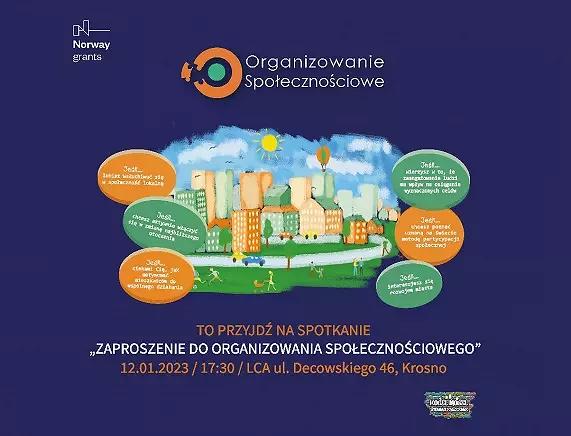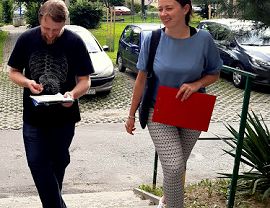12th January 2023 at 5:30 p.m., at the Local Activity Center in Krosno, the Kogel Mogel Association invites you to participate in the event "Invitation to Community Organizing". The intention of the meeting is to encourage the residents of Krosno to get involved in the process, serving the kind of changes in the immediate environment they themselves expect.
The first hour of the meeting will be substantive. Speakers will tell how Krosno became one of two cities in Poland where community organizing has been gradually implemented and tested since 2019, based on the example of the British model within the framework of the EU project "Socially Organized."
- This was certainly determined by the openness of the Krosno authorities to social innovation. Most simply, they gave us - the Center for Strategic Advising (CDS) from Krakow - support, listened and helped open many doors to Krosno institutions, where we explained what community organizing is all about and why it is so important," says Justyna Szymanska of CDS.
- Back then, 4 years ago, our main goal was to spread the word as widely as possible about the innovative method of working with communities. We organized a lot of meetings in Krosno, even ones with the participation of Englishmen working in the profession of community organizing. On the other hand, in the other direction to the UK, we took Krosno officials and candidates for community organizers, so that during study visits in Stockport, they could genuinely experience what this method of interaction has an impact on people and what changes take place thanks to it," adds Magdalena Widuch of CDS.
In the first part of the meeting we will also hear a subjective assessment from Anna and Damian, people who decided to step into the role of community organizers in Krosno.
- We have already worked with this method as volunteers in 2020 under the wings of CDS from Krakow, then it all started. We absorbed knowledge, met people similar to ourselves, those for whom local development is an important part of life, so to speak, a mission they want to influence, teaching the community how to act so that the effort brings results," says Damian Piórko Ziemba, a Krosno community organizer.
- Now is a good time to share our thoughts. Why? Because we've gone from being volunteers to employees, and for the next 14 months, we will be working as full-time community organizers in Krosno as part of a project from the Norwegian Financial Mechanism. It's a big challenge and honour for us, because we can continue the process that has been implemented in Krosno with full professionalism, for as long as two years, by such experienced players in the development of social participation as the Center for Strategic Counselling from Krakow, the British Council Foundation and Community Organisers," adds Anna Zielinska, a Krosno community organizer.
The second hour of the meeting will be engaging. Using the example of the groups gathered, their individual stories, course of action, achievements and failures, a case study will be explored. Representatives of the groups will tell what brought them together, why they work together and what their goal is. Meanwhile, speakers together with community organizers, based on their knowledge and experiences, will reflect and present possible options for what could happen if groups incorporate elements of the so-called community organizing cycle.
![Plakat spotkanie organizowania społecznościowego.jpg [329.97 KB]](https://krosno.pl/storage/image/core_files/2023/1/10/13c81297023267fd94c111e8d699d98d/jpg/umkrosno/preview/Plakat%20spotkanie%20organizowania%20społecznościowego.jpg)
This event will be also an opportunity to look into basic information about a model for people applying for a role of a community organizer, for whom this topic is so interesting, that they’d like to go the same way as Anna and Damian. The project ‘Community organizing in the city of Krosno’, which is funded by the Norwegian Financial Mechanism, will give an opportunity to participate in a professional training and to look into a model of social participation, which has been applied in Britain for 10 years already and is a ready-to-use pattern to be followed by other countries, which gradually notice that the largest potential in changing the world is in local communities. What’s more, one of the participants, who will complete a 4-day training and carry out a task related to the community organizer’s work (in a form of a voluntary work), the so-called listening phase, will be employed to implement actions in the undertaking.
To sum up, an organizer shall invite all interested inhabitants of Krosno, who find listening to local communities essential, who feel a need to connect people with similar needs and to build motivation to care about their interests, for a meeting. Yet it is not about any private needs, but the common ones, which are discussed by a large group of people, who may affect the development of the place they live in.
For some people it’ll be important to construct a new playground, for the other ones to organize a party for neighbours or to develop fair principles within local regulations.
Each type of progress in a social or infrastructural aspect is important and valuable, as the modern cities aim for sustainable development. It’s obvious that people want to live in a place, where there are many opportunities of self-development, where the quality of life gets better every year, where they can feel, that they have everything they need in their surroundings.
ORIGIN OF THE COMMUNITY ORGANIZING IDEA
A method of Community Organising represents both a tactics leading to solve specific problems and difficulties and a long-term strategy of engaging and transferring power of impact to people. It allows for the development of internal opportunities of society, including in particular insufficiently represented groups, and increase in their decisive competence. A person thought to have created the idea of community organizing was Saul Alinsky. His concept presented in the 30s of 20th century, was under a strong influence of then- developing workers’ movement in USA. Alinsky’s approach put an emphasis on making decisions in a democratic way, as well as on the development of local leadership, support for traditional leaders of communities, taking care of people’s interest, use of a conflict strategy and struggle for specific outcomes. At the end of 60s and 70s, this working method was used for political purposes, when community organizing was used as an alternative to radical activism and rebel occurring then in the cities of America.
Another person renowned for the concept of community organising is inter alia Barack Obama, a former president of USA, awarded with the Nobel Peace Prize. This concept has been yet interpreted in many ways. The essence of the original programme of Community Organising in UK, supported by its government, is transmitting the authority from the hands of institutions and experts to the hands of society. This model is based on listening, dialog and relations and underlines the meaning of work with individuals as a basis for collective action. The programme was started at the beginning of 2011 as a part of governmental programme called Big Society. It included the government’s undertaking to transfer the authority to communities. Thus, it was an attempt for creating and implementing politics in a new manner, managed by the communities and not by the government or external agencies. Management of such a prestigious programme participated by hundreds of training organizers and volunteers, through a network of organizers-hosts in the entire country, posed a great challenge. During its pilot phase, the programme was implemented by the Locality3 Organization, and the entity responsible for its further development in UK was Community Organisers Ltd. (CO Ltd.).
In the period from 2011-2015, 500 Social Organizers were trained, who supported then 1500 various local initiatives. Their task was to create relations inside the community, to motivate people to take actions and support projects, that have influence on the everyday life, leading to gradual, social change. Such prepared Social Organizers have become animators, researchers and initiators, being at the same time the intermediaries between inhabitants (their needs, opportunities) and institutions (its needs with respect to knowledge and offer). This is the work, which contains in motivating people to take actions in order to solve their common problems and fight social unfairness. They get to and listen to, connect and motivate people to develop their common influence. The process of Community Organizing aims to determine what is important for people in their communities by talking face to face, create relations and networks, by developing society leaders and mobilizing people to take common actions for the purpose of strengthening the impact and possibility of a real social change. (
(source - www.cds.krakow.pl)
Kogel Mogel Association, as a partner of municipal project “We Create + We Develop + We Activate + We Motivate + We determine + We change = KROSNO”, implemented using the Norwegian Financial Mechanism funds, organizes an event ‘Community organizing in Krosno’, which aim is to motivate local communities basing on the community organizing idea.” The Community Organizing is a concept known in Poland but that’s just a start of its implementation. This method allows for getting knowledge on what inhabitants think about their close surroundings and for connecting them in common actions and for finding a way to cooperate and achieve determined goals. In case of this undertaking, it will be participation directed on integration of young people and revitalization of the Krosno market square. The project is a response to the alarming statistics of the city of Krosno, which show social passivity and insufficient level of the city co-management.
![logo Norway grands.png [6.05 KB]](https://krosno.pl/storage/image/core_files/2022/9/8/c12af7ea4ac170c1308568218ee44c59/png/umkrosno/preview/logo%20Norway%20grands.png)
The project „We create+ We develop+ We activate+ We motivate+ We determine+ We change= KROSNO” implemented as a part of the Local Development Programme, co-financed in 85 % from the Norwegian Financial Mechanism 2014-2021 and in 15 % from the State Budget.
„Working together for a green, competitive and inclusive Europe"
The amount of funding received is 15,328,498.86 PLN. The beneficiary/lead partner is the Municipality of Krosno. The aim of the project is to comprehensively improve the quality of life in Krosno and better adapt Krosno's administration to the needs of its residents.





![herb.png [21.51 KB]](https://krosno.pl/storage/image/core_files/2020/9/16/3c5221ac49d04b697c0f0dda11ca7266/png/umkrosno/preview/herb.png)